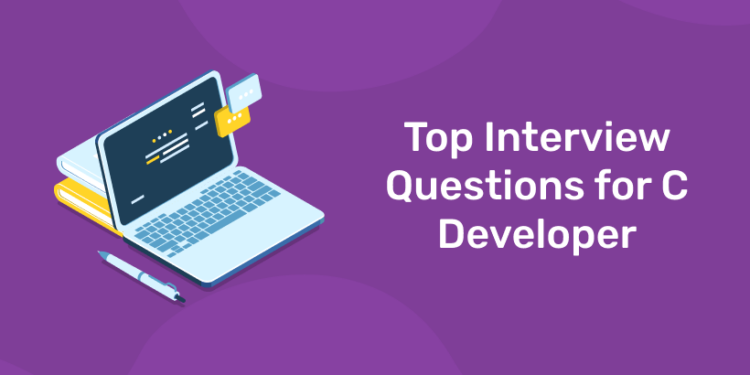Table of Contents
Programming is the process of giving instructions to a computer to perform a particular task. In another way, it is a way of making communication happen between humans and computers. The computers work with the help of computer programs or computer software. This software is created with the help of coding. For coding, there is a need for programming languages. There are three basic ideas for a basic logical structure for computer programming. These are:
- Sequence
- Selection
- Repetition
There are many programming languages out there. Some languages are designed to perform a certain types of tasks. Some are used for overall development purposes. They may be cross-platform, object-oriented, open-source, etc. These languages also help developers to solve problems. Programming is a set of skills. Programs also termed codes and programming is also called coding.
What is C Programming Language?
C is a general-purpose programming language. C programming language is invented by Dennis Ritchie. The origin of the C language is considered back in 1972. This is one of the popular programming languages which is flexible to use. This is also a structured language. C is used in writing operating systems like windows and to write various applications. C is a machine-independent programming language. C is based on the ALGOL language. Knowledge in C language will be helpful when learning other programming languages. C shares some equal concepts which other languages. It contains different modules and all these modules combine to form C language. This is why the C language is called a structured programming language. C language is widely used in the software development field. C is also a highly portable language.
Are you aspiring for a booming career in IT? If YES, then dive in |
||
Full Stack Developer Course |
Python Programming Course |
Data Science and Machine Learning Course |
Key Advantages of C Language
- It is a powerful language
- C is more close to Machine language
- C is a low-level programming language
- C contains different modules
- C is a structure-oriented language
- C is compatible with different hardware platforms and various operating systems
- C programming language can extend itself
Applications of C Language
- Mostly used in embedded systems
- The main application is the development of system applications
- Broadly used in the development of desktop applications
- Adobe uses C language for most of their applications
- Development of browsers and their extensions. Chromium from google is an example
- Operating systems development is also a key application of C Programming Language
- Databases developed using C Programming language
- Programming language which is closely associated with UNIX operating systems
Top Interview Questions for C Developer
1: Which of the following data structures allows elements to be added and removed in a Last-In, First-Out (LIFO) order?
C programming language is one of the robust programming languages. It has a wide range of key applications. So a career as a C Developer is highly paid and has a high growth rate. So let us look into some of the top interview questions for C developers.
1. What is C Programming Language?
C language is defined as a general-purpose programming language used for structured programming.
2. What are the key features of C Language?
A rich library with great support. Fast language and an efficient one. A middle-level procedural language. The base of all other languages.
3. List out the key application of the C language?
Development of system applications and desktop applications.
4. Why C language is termed as the base of Programming Language?
It is portable and with very small changes it can be run on any platform.
5. Explain briefly the origin of the C Language?
Developed by Dennis Ritchie in 1972. It succeeded the B language. It was the basis of UNIX.
6. How many keywords are there in C Language?
There are 32 keywords used in the C Programming Language.
7. Explain the use of modules in C Language?
Modules in C language help efficient program development. It also helps in modifying the process and eases debugging.
8. Why C language is considered highly portable?
Because C programming is not dependent on any hardware or system.
9. How many steps are there in the execution of C Language?
There are mainly 3 steps in the execution of C Language.
10. List out four popular compilers available for C Language
Borland Turbo C, Tiny C, Portable C, and GCC
11. Which are the common built-in functions used in C?
scanf(), printf(), strcpy, strlwr. These are also called library functions.
12. Can a string convert to a number in C?
Yes. atoi() function converts a string to a number.
13. Does C support function overloading?
C doesn’t support function overloading. This is because the C language is not an Object-Oriented Programming Language.
14.List out the dynamic allocation function in C Language
malloc(), calloc (), free(), realloc() are the dynamic functions in C.
15. Explain static function in C language
The function of C is global. When a static keyword is added before a function, it becomes a static function. The static functions are restrained to the file they are declared.
16. Which are the basic data types present in C Language?
Char, Float, Int, and Double are the basic data types present in C.
17. What are static variables in C Language?
Static variables are variables initialized only once. The default value is always zero.
18. What is referred to as C Token?
C tokens are the smallest units present in the C language.
19. How can we mention a null character in C Language?
A null character is mentioned as ‘/0’ or ‘0’.
20. Explain memory leak in C Language?
A memory leak is the lack of proper deallocation of the previously allocated piece of memory by the programmer.
21. Explain prototype functions in C Language?
It is simply the declaration of a function that states the name of the function and parameters.
22. What is the format of the general form of function in C Language?
The general form of function is – return_type function_name (Parameter list) {body of function}
23. What is meant by Typecasting?
It is the process of converting one data type to another type.
24. What is meant by macros?
This is a piece of code replaced by the value of the macro
25. A key difference between macros and Functions?
The key difference is Macros help repeat small codes while functions help to write large codes.
| Related Article | |
| Mern stack interview questions and answers | Top C++ Interview Questions and Answers |
Build Better, Together. 🛠️ Join the Entri Coding Community!
Beyond syntax, there’s strategy. 🚀 Join our subreddit for: Exclusive Coding Roadmaps 📍,Project Case Studies 📂 ,Interview Prep Tips 💡and more
👉 Join our Reddit communityConclusion
C Programming language is a widely used one. This is termed the mother of all programming languages. C Programming language is easy to learn and also it is easy to work with. The C community offers great support to its developer. It is mainly used in software development, operating systems, etc. The features of C show that a career in C will be having great opportunities. So building a career in C will help to secure job security.
| Our Best Upskilling Courses | ||
| Data Science Course | Python programming Course | Full-stack development course |
| Digital Marketing Course | SAP Fico Course | Software Testing Program |










